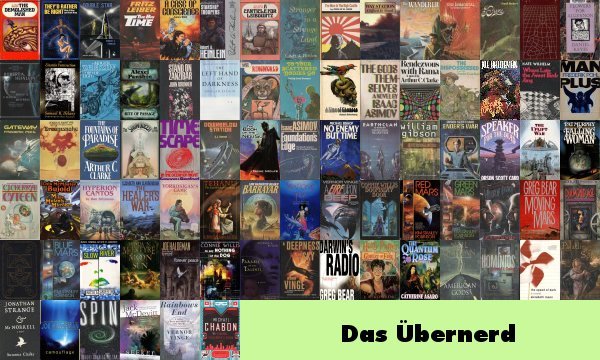 Sleeper
Sleeper1974 Hugo Winner for Best Dramatic Presentation
1975 Nebula Winner for Best Dramatic Presentation
Remember when Woody Allen was funny instead of melodramatic and creepy? Yes, there was a time when Woody Allen was best known for comedy rather than pretentious dramas about neurotic, Jewish New Yorkers and seducing teenage adoptive daughters. Admittedly the comedies were also about neurotic, Jewish New Yorkers but at least if you didn't like one of his movies you weren't told how you were too unsophisticated and too not from New York to appreciate the subtle nuances.
In Sleeper Allen plays a man frozen after complications from removing an ulcer who awakens in a bizarrely run dystopia, something like what it would be if Big Brother was one of the Three Stooges. The resistance wants to use him since he doesn't have a registered identity but Allen runs from them and the police (I don't think the character name matters there since Woody Allen is always playing Woody Allen regardless of the name in the script). Eventually he abducts a socialite while getting away from the police and through standard plot #7 they start out hating each other but grow closer until they must work together to bring down the repressive government.
I'm being unfair to the plot there but it doesn't really matter since it's just a coat rack for Allen to hang comedy routines onto. A typical sequence is Allen is avoiding the police through some kind of wacky method, then he encounters a crazy bit of future technology which malfunctions horribly for him causing hijinx, then he is found and must run again.
The bulk of the humor is sight gags and slapstick which didn't connect with me. There are several sequences that are built like silent comedies particularly when Allen is running from Big Brother's Keystone Cops. When he's not running around to sped up film Allen may be miming like a domestic robot or spinning a wheelchair around. The sight gags are mainly some piece of zany future technology that goes out of control when Allen attempts to use it. I just don't find that kind of physical humor very funny.
Perhaps that's why my favorite segments of the film dealt with Diane Keaton's character. When she's onscreen the jokes tended toward wordplay and odd situations which I appreciated more. She's the one who is really given the story in the film which I think made me more interested in what she did than what Allen did. In Sleeper Allen's character wakes up and then spends the whole movie reacting while Keaton's character develops and takes action.
While I'm talking about this movie, can someone tell me why science fiction movies are obsessed with the idea that humanity will do away with sexual intercourse in the future? At least until a virile twentieth century man comes along and teaches the hot woman of the future how to love (please don't snicker too much at the concept of Woody Allen as "virile"). I don't encounter this idea is written science fiction but there's quite a few movies where machines and drugs have replaced sex. It's not subtle or clever, it just makes me wonder what the screenwriter the screenwriters are doing in their sex life that makes them think that.
I didn't care for the movie myself but if someone came up to me and said "I loved Sleeper, it was so funny!" I wouldn't be able to fault them for it (as opposed to saying "I love Meet the Spartans, it was so funny!" in which case I'd rush them to an emergency room before the neurological damage became permanent). Humor is a very subjective thing and this film just didn't work for me. Here is a simple test to give you an idea if it might match up for you: if the thought of Woody Allen in a giant inflatable suit is funny to you then you may want to give it a try.





